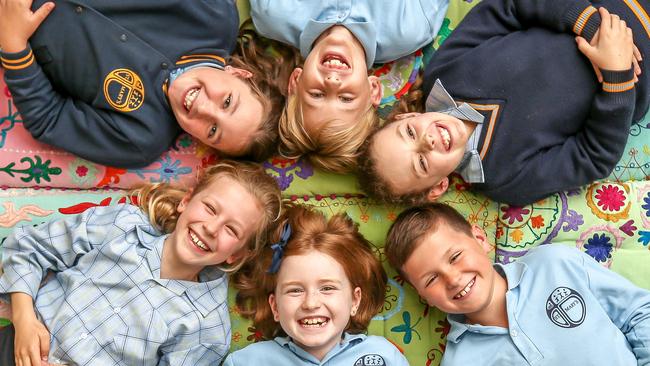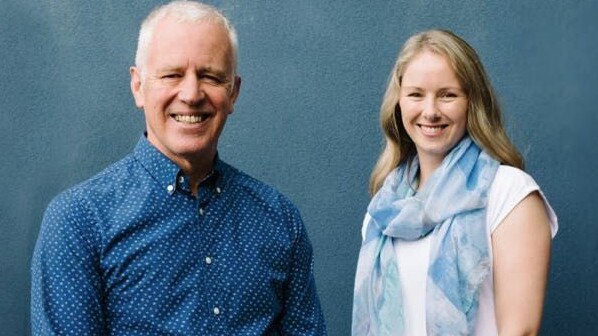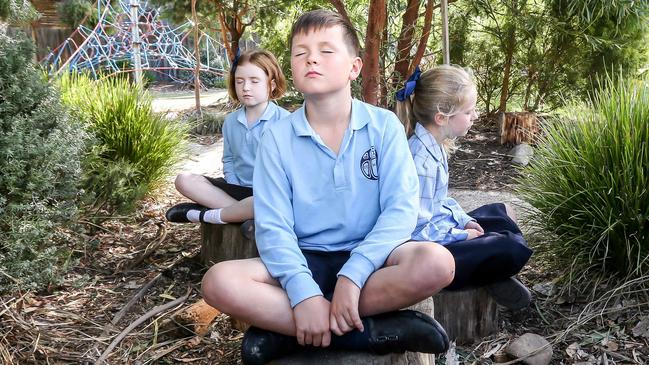Childhood anxiety: How parents can recognise anxiety danger signs in kids
With many Australian children suffering from anxiety, authors Michael Grose and Jodi Richardson have compiled valuable tips to help parents spot the danger signs, while one Melbourne school has developed its own calming solution.

News
Don't miss out on the headlines from News . Followed categories will be added to My News.
Teaching kids to recognise panic and negative emotions is the key to calming an anxious mind.
An estimated half a million Australian children suffer with fears or phobias that impact on their daily lives.
But experts say parents can equip themselves with the tools to lead their kids back to reassurance and resilience.
ANXIETY EPIDEMIC HAS AUSSIE KIDS IN ITS GRIP
HOW TO TELL IF YOUR CHILD HAS ANXIETY
HOW STUDENTS CAN MANAGE STRESS
Parenting writer Michael Grose and Dr Jodi Richardson said the simplest of activities at home could help kids overcome their fears.
“Children and teenagers shouldn’t be sheltered from the challenges and expectations of everyday life. Their anxiety needs to be factored in, but should not excuse them from participating in normal daily events,” Mr Grose said.
“Instead of just offering reassurance, it’s important for parents to help children understand they are experiencing anxiety and what it means.”
Their book, Anxious Kids: How children can turn their anxiety into resilience, offers scripts to help kids and parents recognise their negative emotions and give them “tools that help them deal with it in the moment”.
Mr Grose said small routine changes such as walking home from school could help kids calm down.
“Walking can help to get rid of anxiousness thanks to the mindless chatting and physical exercise,” he said. “A lot of our lifestyle keeps kids highly aroused and kids are not able to relax.”
Dr Richardson said cutting out some organised activities could also be beneficial: “For children, having nothing to do can be great and gives them a sense of control over their time. It may not look like it, but a lot is going on such as decision-making, negotiating, problem-solving, being creative and having choices.”

She said better nutrition and gut health, more play time, less scheduled time and less time on screens could help.
Dr Richardson said screens not only held “the risk of accessing content which may be upsetting, frightening or confusing”, but also led to kids missing out on “things that make them feel good such as physical activity, meeting friends and spending time outdoors”.
“Every hour on a device is one less hour kids have to develop healthy lifestyle habits and develop positive views of themselves by cultivating their character and exploring their values,” she said. Other protective factors include fostering resilience, focusing on empathy, getting more sleep and building relationships.
Clinical psychologist and Developing Minds director Kirrilie Smout said schools were a good place for parents to start to seek help, as well as visiting GPs and accessing online resources.
“There are things parents can do to make things better such as helping children soothe themselves in the moment so they can start to calm themselves down,” she said.
Anxious children should also be slowly and gradually introduced to the things that made them anxious.
“For most children, there is significant improvement if they are treated when they are young, and the effect can last up to 15 years.”
Ms Smout said parents could make things worse by being “excessively protective from everything” or “excessively harsh and angry”.

HELPING KIDS GIVE PEACE A CHANCE
Pupils at St Mary’s Primary School in Hampton are being taught how to be peaceful, mindful and resilient.
Psychotherapist and counsellor Georgina Manning, director of Wellbeing for Kids, is running a Peaceful Kids program at the school.
Principal Matthew Sweeney said the program, now in its second year, has led to kids being able to better express their feelings.
“I have noticed a difference in the way kids use language to describe how they are feeling and think about what they can do and what problem strategies they can put in place,” he said.
The program involves staff attending Peaceful Kids training offsite to run term-long programs that help students develop mindfulness techniques to manage their emotions.
Ms Manning said mindfulness helped children to learn to self-regulate, find
a place of calm and increase positive mental health.
“I see a lot of children who find it hard to relax, wind down at the end of the day and sleep. They are over-reactive to the normal bumps in the road and avoid small challenges. They intuitively know they need this to balance out a frantic life and soothe their stress response and worries,” she said.

Help your kids
* Teach kids to check in with their emotions by standing still and quietly
* Encourage kids to keep a diary
* Help them learn to breathe deeply
* Encourage them to be kind to themselves
* Ensure they exercise regularly
Tips for parents
* Be present when you are with your children
* Ditch the digital devices when you are with your family
* Conduct a mental detox before coming home
* Do one thing at a time
* Set aside dedicated one-on-one time for your kids
Source: Anxious Kids
Anxious Kids: How children can turn their anxiety into resilience, by Michael Grose and Dr Jodi Richardson, Penguin Life, RRP $34.99.


